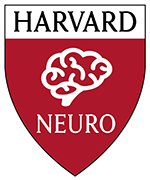Neuroscience concentrator Kelsey Ichikawa (‘20) has been awarded a Bowdoin Prize for Undergraduate Essay in the Natural Sciences. The Bowdoin Prizes, which were established in 1791 and are awarded through the FAS Prize Office, celebrate student essays that delve into academic topics while demonstrating literary merit and remaining accessible to laypeople.
Ichikawa’s essay, called “Visualizing the Mind: How We See the Brain through Functional MRI,” recounts her first encounters with fMRI as a research assistant and her journey toward understanding more of the complexity and controversy around interpreting and using fMRI data. To write it, she conducted interviews with several scientists, but the essay also encompasses her personal experiences of working with fMRI images, running stats on fMRI data, and performing scans herself.
The project grew out of a science journalism course Ichikawa took with Michael Pollan. ”While writing this article, I was learning the ropes and conducting fMRI research for my senior thesis, and I wanted to capture that process of neuroimage creation, which is so much more complex than a simple “click” of a brain camera,” Ichikawa says.
“This essay was actually one of the hardest things I’ve written in college I think because narrative reporting is so different from academic writing in both science and philosophy,” Ichikawa says. “Making an argument through scenes and tracing the stories of individual people is oftentimes the precise type of anecdotal evidence that we’re taught to avoid in academic papers, but that form of storytelling is so powerful in engaging an audience.”
The opening section of her essay recounts a time when Ichikawa herself had her brain scanned. Reflecting on the experience, she writes:
“At first, fMRI seemed more straightforward than the electrophysiology research I had done previously. Instead of interpreting arcane graphs of electrical impulses and creating delicate setups to plug electrodes into birds, here, all I had to do was slide a person inside an MRI scanner to detect the shiny blobs of activation (oh, naiveté).
Little did I anticipate what a scientific morass I had entered: Magnetic resonance imaging has transformed medicine and science, but its use in cognitive and psychological science, fMRI, is notoriously controversial. This is partly because the technology doesn’t directly measure neural activity but a proxy for it—oxygenated blood flow.
It also requires an enormous amount of data processing to sort signal from noise, data processing that requires many discretionary choices on the researcher’s part. In recent years the field has dealt with a host of issues involving software glitches and misused statistics, and continues to grapple with the causation vs. correlation conundrum and unwarranted conclusions about the regions responsible for social emotions. Collectively, these challenges have complicated fMRI’s use in clinical contexts and attempts to commercialize the technology for purposes such as lie detection and marketing.”
Ichikawa hopes to publish a version of her essay in a publication aimed at general readers.
She intends to continue writing stories about science in one form or another. At present, she’s working on a project about the reproducibility crisis in psychology and life sciences, where researchers have been unable to replicate the results of thousands of studies. “Science communication is not just about educating or informing the so-called public but also about reducing the black box-iness of science to enable a more participatory, democratic conversation about how science ought to proceed,” she says, adding that this summer, she may try her hand at some creative writing genres.
Being part of the MCB and Neuroscience community at Harvard has meant a lot to Ichikawa. “I really appreciated the strong foundations in biology that the MCB department built into the
undergraduate neuroscience program,” she says. “Special shoutout to MCB105, Florian Engert’s Systems Neuroscience course, which taught me so much about analyzing neural circuits through Marr’s levels of analysis, and Talia Konkle’s Essentials of fMRI course, in which I learned many of the fundamentals about neuroimaging.” Ichikawa would also like to thank her postdoc mentor Will Moore, PI Mina Cikara, and the staff at the Center for Brain Science.
Congratulations to Kelsey!
by Diana Crow



